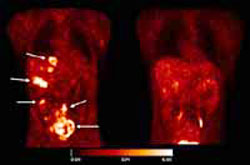A marker for new blood vessel formation in tumors

ávâ3 integrin expression in tumors. (Photo: Roland Haubner, et al.)
In a paper in this month’s freely-available online global health journal PLoS Medicine, Roland Haubner and colleagues describe how a compound they have developed can be used together with highly sensitive positron emission tomography (PET) scanning to measure the amount of new blood vessel growth in some tumors.
New blood vessel growth – angiogenesis – is important for the growth of tumors; several drugs target angiogenesis specifically. The compound previously developed by Haubner and colleagues is a fluorine-labeled glycopeptide, ([18F]Galacto-RGD), which binds tightly to a receptor – ávâ3 integrin -expressed in some tumors, especially in the blood vessels. As well as a role in angiogenesis, integrins are important in holding tumor cells together and connecting them with the extracellular matrix; what happens when these interactions break down is one of the keys to determining how tumors metastasize.
Haubner and colleagues’ work, in a mouse with human melanoma and in a small study of patients with tumors including melanoma, suggests that the marker is truly reflecting the in vivo level of the integrin. Hence the marker could be used to identify tumors that express this marker, assess the degree of new vessel formation in tumors, and help in the planning and monitoring of anti-angiogenic therapies which target this integrin.
Media Contact
More Information:
http://www.plos.orgAll latest news from the category: Life Sciences and Chemistry
Articles and reports from the Life Sciences and chemistry area deal with applied and basic research into modern biology, chemistry and human medicine.
Valuable information can be found on a range of life sciences fields including bacteriology, biochemistry, bionics, bioinformatics, biophysics, biotechnology, genetics, geobotany, human biology, marine biology, microbiology, molecular biology, cellular biology, zoology, bioinorganic chemistry, microchemistry and environmental chemistry.
Newest articles

Economies take off with new airports
A global study by an SUTD researcher in collaboration with scientists from Japan explores the economic benefits of airport investment in emerging economies using nighttime satellite imagery. Be it for…

CAR T–cell immunotherapy targets
Pan-cancer analysis uncovers a new class of promising CAR T–cell immunotherapy targets. Scientists at St. Jude Children’s Research Hospital found 156 potential CAR targets across the brain and solid tumors,…

Stony coral tissue loss disease
… is shifting the ecological balance of Caribbean reefs. The outbreak of a deadly disease called stony coral tissue loss disease is destroying susceptible species of coral in the Caribbean…





















